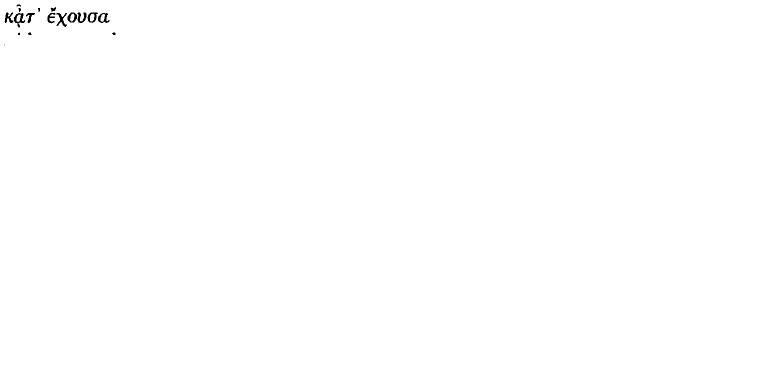Research Article
‘O Ancient Argos of the Land’: Euripides, Electra1
-
- Published online by Cambridge University Press:
- 11 February 2009, pp. 1-2
-
- Article
- Export citation
Euripides, Electra 473–5
-
- Published online by Cambridge University Press:
- 11 February 2009, p. 3
-
- Article
- Export citation
Interpolations in the Phoenissae: Papyrus Evidence
-
- Published online by Cambridge University Press:
- 11 February 2009, pp. 4-10
-
- Article
- Export citation
Iphigeneia and the Bears of Brauron
-
- Published online by Cambridge University Press:
- 11 February 2009, pp. 11-13
-
- Article
- Export citation
Catalexis: 1. Definition and Function
-
- Published online by Cambridge University Press:
- 11 February 2009, pp. 14-28
-
- Article
- Export citation
Plato on the Grammar of Perceiving
-
- Published online by Cambridge University Press:
- 11 February 2009, pp. 29-51
-
- Article
- Export citation
Plato's Vision of Chaos
-
- Published online by Cambridge University Press:
- 11 February 2009, pp. 52-61
-
- Article
- Export citation
Agesilaus and Sparta*
-
- Published online by Cambridge University Press:
- 11 February 2009, pp. 62-84
-
- Article
- Export citation
Demosthenes and Philip's Peace of 338/7 B.C.
-
- Published online by Cambridge University Press:
- 11 February 2009, pp. 85-87
-
- Article
- Export citation
Bastards as Athenian Citizens
-
- Published online by Cambridge University Press:
- 11 February 2009, pp. 88-91
-
- Article
- Export citation
The Development of the Quaestorship, 267–81 b.c.
-
- Published online by Cambridge University Press:
- 11 February 2009, pp. 92-106
-
- Article
- Export citation
Propertius 1.1 and Callimachus, Lyrica, Fr.228?1
-
- Published online by Cambridge University Press:
- 11 February 2009, pp. 107-109
-
- Article
- Export citation
Horace, Epistles 1. 19. 37–40
-
- Published online by Cambridge University Press:
- 11 February 2009, p. 109
-
- Article
- Export citation
Ovid, Met. 1.4
-
- Published online by Cambridge University Press:
- 11 February 2009, pp. 111-112
-
- Article
- Export citation
Identification of Another Heinsian Manuscript
-
- Published online by Cambridge University Press:
- 11 February 2009, pp. 113-114
-
- Article
- Export citation
Agricola 24.2
-
- Published online by Cambridge University Press:
- 11 February 2009, p. 115
-
- Article
- Export citation
On ‘Plutarch’, De Libidine et Aegritudine 9
-
- Published online by Cambridge University Press:
- 11 February 2009, p. 116
-
- Article
- Export citation
Errors in Arrian
-
- Published online by Cambridge University Press:
- 11 February 2009, pp. 117-139
-
- Article
- Export citation
Elocvtio Novella
-
- Published online by Cambridge University Press:
- 11 February 2009, pp. 140-141
-
- Article
- Export citation
Some Allusions to Earlier Hellenistic Poetry in Nonnus
-
- Published online by Cambridge University Press:
- 11 February 2009, pp. 142-150
-
- Article
- Export citation

 can stand. ‘Argos of the land’ (or, ‘of land’) is nonsense, and even if it were not, is absurd as an apostrophe of the River Inachus.
can stand. ‘Argos of the land’ (or, ‘of land’) is nonsense, and even if it were not, is absurd as an apostrophe of the River Inachus.  ‘a plain’, indistinguishable from
‘a plain’, indistinguishable from  is similarly impossible: the audience would be baffled;
is similarly impossible: the audience would be baffled;  in 6 has to be the first occurrence of the
in 6 has to be the first occurrence of the  could have been understood as meaning this.
could have been understood as meaning this. found in both L and P) has been accepted without any serious search for a more meaningful alternative. Even if it be thought that Euripides was capable of adding
found in both L and P) has been accepted without any serious search for a more meaningful alternative. Even if it be thought that Euripides was capable of adding  , in an unusual sense producing an awkward tautology, to
, in an unusual sense producing an awkward tautology, to  , surely this should only be accepted in the absence ofa more credible emendation which departs no further from the manuscripts? Is there such an alternative? In the corresponding last line of the strophe we have
, surely this should only be accepted in the absence ofa more credible emendation which departs no further from the manuscripts? Is there such an alternative? In the corresponding last line of the strophe we have  : the first syllable of
: the first syllable of  is doubtful; there seems to be no convincing metrical objection to its being a long syllable here. This atonce suggests the maintenance of the manuscripts'
is doubtful; there seems to be no convincing metrical objection to its being a long syllable here. This atonce suggests the maintenance of the manuscripts'  to maintain the metrical balance.
to maintain the metrical balance. makes the ‘bears’ more than ten years old, contrary to all other evidence; and the meaning of of A. Ag. 239
makes the ‘bears’ more than ten years old, contrary to all other evidence; and the meaning of of A. Ag. 239  . She argues cogently that
. She argues cogently that  in Aeschylus means ‘shedding’ the saffron robe, as most editors including Fraenkel have thought, and not ‘letting her robes fall to the ground’ as Lloyd-Jones, followed by Page, has argued.
in Aeschylus means ‘shedding’ the saffron robe, as most editors including Fraenkel have thought, and not ‘letting her robes fall to the ground’ as Lloyd-Jones, followed by Page, has argued. What this position was has never been satisfactorily explained.
What this position was has never been satisfactorily explained.

 but
but  , and the
, and the  can have the force of a pluperfect and refer to a time prior to that of the verb of a following clause.
can have the force of a pluperfect and refer to a time prior to that of the verb of a following clause. (Aetia fr. 1. 3 Pfeiffer). Much less has been written about
(Aetia fr. 1. 3 Pfeiffer). Much less has been written about  want to establish that passivity, the experiencing of desire, grief, and the like, is a thing of the body and not of the soul, which, they maintain, is
want to establish that passivity, the experiencing of desire, grief, and the like, is a thing of the body and not of the soul, which, they maintain, is The climactic
The climactic  structure makes it plain enough that what is in dispute and has to be proved is that the soul is
structure makes it plain enough that what is in dispute and has to be proved is that the soul is  , and that what is assumed for the proof is that it is
, and that what is assumed for the proof is that it is  . It is, therefore, wrong to change the text so as to make those engaging in the proof try to argue from
. It is, therefore, wrong to change the text so as to make those engaging in the proof try to argue from  instead of the other way round.
instead of the other way round.